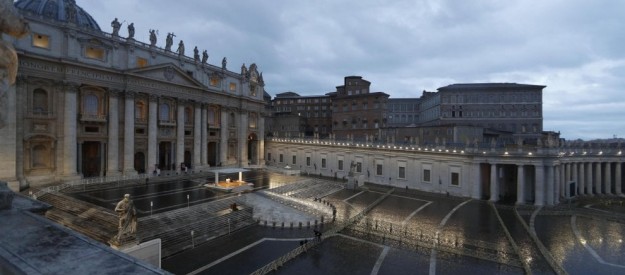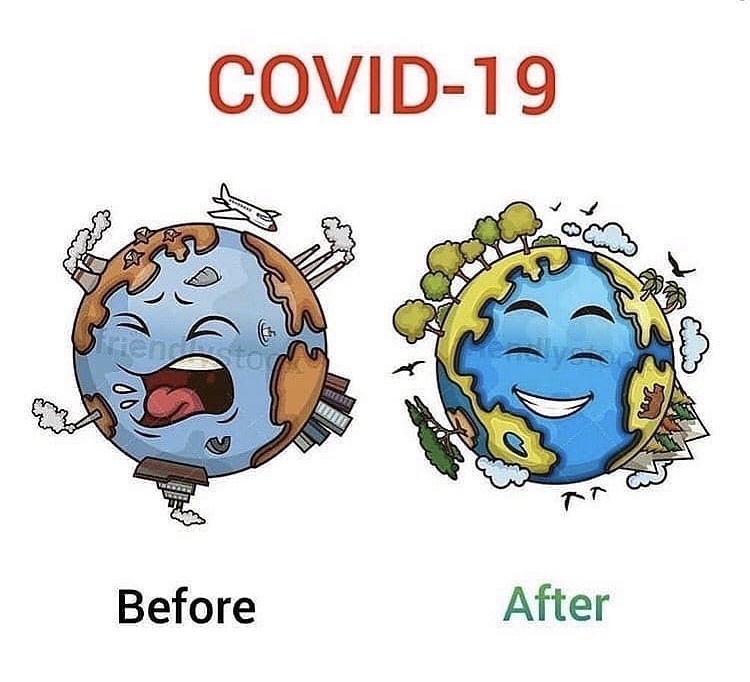"We are losing our attitude of wonder, of contemplation, of listening to creation and thus we no longer manage to interpret within it what Benedict XVI calls 'the rhythm of the love-story between God and man.'"
+ Pope Francis
“New lifestyles”

The storm exposes our vulnerability and uncovers those false and superfluous certainties around which we have constructed our daily schedules, our projects, our habits and priorities. It shows us how we have allowed to become dull and feeble the very things that nourish, sustain and strengthen our lives and our communities. The tempest lays bare all our prepackaged ideas and forgetfulness of what nourishes our people’s souls; all those attempts that anesthetize us with ways of thinking and acting that supposedly “save” us, but instead prove incapable of putting us in touch with our roots and keeping alive the memory of those who have gone before us. We deprive ourselves of the antibodies we need to confront adversity.
+ Pope Francis, Extraordinary Moment of Prayer, Urbi et Orbi, March 27, 2020
Listening to the Holy Father during yesterday’s stunning and truly historic moment in Saint Peter’s Square, I could not help but remember these words of his predecessor:
“What is needed is an effective shift in mentality which can lead to the adoption of new life-styles ‘in which the quest for truth, beauty, goodness and communion with others for the sake of common growth are the factors which determine consumer choices, savings and investments.’” (Italics original)
Benedict XVI wrote this in his 2009 encyclical Caritas in Veritate, quoting Saint John Paul II’s 1991 encyclical Centesimus Annus. This sentiment and those encyclicals, and others, were foundational to Pope Francis’s eco-teachings—most especially his 2015 encyclical Laudato Si’—and they have culminated in the Holy Father’s quite extraordinary message yesterday, given to the world in an empty, rain-swept Saint Peter’s Square on a darkening Friday evening in Lent
The interconnectedness of papal teachings should come as no surprise (although for many, sadly, it does). After all, the interconnectedness of Catholic teachings themselves comes from the Gospel of life, which has been revealed to us by the one true God.
Until recently, such exhortations, given again and again by Pope Francis and his predecessors, have struggled to gain traction. Irrespective of the hard work of so many Catholics, especially the Church’s often-heroic global eco-advocates, the concept of “new lifestyles” has remained largely untried—as if it were some intellectual nicety that we could urge but never achieve.
Well, all that’s changed.
In a matter of months, weeks, and even days, the spread of the coronavirus has changed lifestyles across the world. The disease has infiltrated the poor and the wealthy, young and old, believers and unbelievers. And if the projections are even close, we’ll see for some time a need to eliminate crowds; to shelter in place; to distance ourselves from others to protect strangers—to protect the most vulnerable.
All this has already begun changing how we look at things. While we’ve seen a fair amount of fear and self-centeredness in the wake of COVID-19, we’ve also witnessed remarkable sacrifice and dedication—by health care workers, first responders, utility workers, supermarket staff, truck drivers, reporters, families, friends, and strangers. Many of us have become aware, maybe for the first time, of the concept of a supply chain—of people elsewhere growing or making the stuff that we need to survive.
In our homes, people are baking bread. And they’re making phone calls, not simply texting. They’re learning the value of frugality and sewing and taking walks as families.
As Pope Francis put it yesterday, “In this storm, the façade of those stereotypes with which we camouflaged our egos, always worrying about our image, has fallen away, uncovering once more that (blessed) common belonging, of which we cannot be deprived: our belonging as brothers and sisters.”
The forced disconnection with our former ways of life is teaching us the basics of lifestyles known and appreciated by my parents’ generation and every generation that preceded theirs. In the end, much of this relearning of the basics—of simplicity and relationships—will be good for the world and its ecosystems.
Some are even calling this a silver lining.

comments calling humanity the "true virus,"
demonstrates an eco-view that is incompatible
with Catholicism and basic human decency.
But now is not the time to say such things. While so many are suffering tremendously as I type these words or dying alone, it is wrong to cheer perceived eco-victories, as seen in this cartoon that has made the rounds of social media.
Frankly, this sort of thing is heartless. Indeed, it is Godless.
Pope Francis, of course, set all this right.
“Greedy for profit, we let ourselves get caught up in things, and lured away by haste. We did not stop at your reproach to us, we were not shaken awake by wars or injustice across the world, nor did we listen to the cry of the poor or of our ailing planet. We carried on regardless, thinking we would stay healthy in a world that was sick. Now that we are in a stormy sea, we implore you: “Wake up, Lord!”
What we are all experiencing—and will experience—in this stormy sea will teach us three lessons, the kind that catastrophes oft remind the human race.
The first is humility. The second is the value of life and relationships. And the third, which is related to the first two, is the utter vanity of lifestyles of consumption and disposal.
There will be a time to speak more precisely of ecology—to reflect on new lifestyles and possibly rejoice in newfound ways of seeking peace, ways that will benefit our local and global common home.
But now is not that time.
As Pope Francis reminds us, now is the time to pray and fast and to turn to the Lord and say, “Here I am, Lord. Let me help.”
But what does that mean? Truly? What does proper help look like in this dark age?
Beyond the physical help we can all bring—the sharing of food, running errands, and the like—and beyond the specific help of particular vocations, let’s ponder the words of another encyclical by Benedict XVI—words that seem to have prophesied the very pontificate of Pope Francis.
Love of neighbour is thus shown to be possible in the way proclaimed by the Bible, by Jesus. It consists in the very fact that, in God and with God, I love even the person whom I do not like or even know. This can only take place on the basis of an intimate encounter with God, an encounter which has become a communion of will, even affecting my feelings. Then I learn to look on this other person not simply with my eyes and my feelings, but from the perspective of Jesus Christ. His friend is my friend. Going beyond exterior appearances, I perceive in others an interior desire for a sign of love, of concern. This I can offer them not only through the organizations intended for such purposes, accepting it perhaps as a political necessity. Seeing with the eyes of Christ, I can give to others much more than their outward necessities; I can give them the look of love which they crave. Deus Caritas Est, 18


















